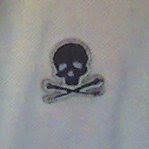
I've just finished watching the first season of The Tudors last night, and, whoa.
When I first heard that CBC was going to show this this fall, I was so there, for many reasons of course. Being an history buff and an anglophile of course this would be of interest to me, but more importantly I wanted to see how Thomas Cromwell was portrayed.
I had to remember going into this that it is historical fiction - following real events and figures in history, but fiction had to fill in the gaps. Beginning in the earlier part of King Henry VIII's reign (ten years in I'm told), we meet Henry and his court, a cast of characters: Cardinal Wolsey, Duke of Norfolk, Sir Thomas More, etc. There is much bodice ripping, scheming, and secondary plot lines of episodic nature. I never remembered reading of a widespread plague - played out as the "sweating sickness" - during Henry VIII's reign, only that of the 1349 and 1666 plagues, but who's not to say there could have been a minor epidemic during that time. I suspect much of this is imagined for us.
For the first couple of episodes I was thrilled to see a minor credit to actor Steven Waddington (of The Last of the Mohicans fame) as the Duke of Buckingham. It's an inside name game with that one so I wouldn't expect anyone outside of my family to understand. But he was plotted against, sent to the Tower, and executed, so sadly that story line didn't last more than a few episodes.
Henry meets Mary, then Anne Boleyn (setting up the eventual adverts for The Other Boleyn Sister, the film based upon the book, coming to theatres near you in February! Yes, I'm such a sucker for films like these), falls in love, and the search for divorce from Catherine of Aragon and the fall of Wolsey begins.
Thomas doesn't appear until the third to last episode, when he hands Anne a Protestant book, which would have been heretical in those papal times. After that, he is seen initially as an errand boy, but then more and more with Henry, who takes a liking to him as a way to clear his conscience for the divorce. In the last episode, Henry exclaims "I have high hopes for Cromwell," while a couple onlookers (I'm not sure of the minor character names) say "Cromwell is cunning."
The season ends with Wolsey taking his life during a musical montage juxtaposed with a courtier play depicting Wolsey going to hell after leading a greedy and self-serving lifestyle, not to mention Thomas More saying he will be harsher on heretics and burning them after a conversation with Cromwell said in confidence, which he does burn an unnamed heretic shortly thereafter. With Wolsey dead, Henry and Anne make off for the forest for a tryst. Frustratingly, Anne throws Henry off of her mid-coitus, presumably because she doesn't want to be pregnant if they get married and have a bastard child. Daddy Boleyn's words ring: Keep Henry's interest longer.
Initially, Thomas More is likeable, fresh off his Utopia publishing, but as time goes on, his idealism for saving papacy in England grows dangerous. Conversely, Wolsey is seen as shamelessly scheming, then turns to pity as he loses favor, banished, and arrested for treason. Henry seems like a pawn, anyone close to him can influence him any way the wind blows, which is somewhat saddening, but His Majesty has the power to do what he likes, again, seemingly under the guise of his court's patrons.
A second season is coming (I can't wait... SQUEEEEE!! - I just might order Showtime so I can see it in HD and sooner than when CBC can bring it, commercial free) and it seems as though the soft cliffhanger will deliver: More reformation, more scheming, more plot twists, more bodice ripping, more history. And certainly more Thomas Cromwell, as history tells us.
4.5 out of 5 stars, a must see. Full episodes are still available on demand at CBC.ca/Tudors. Picture care of tv.yahoo.com/tudors.








No comments:
Post a Comment